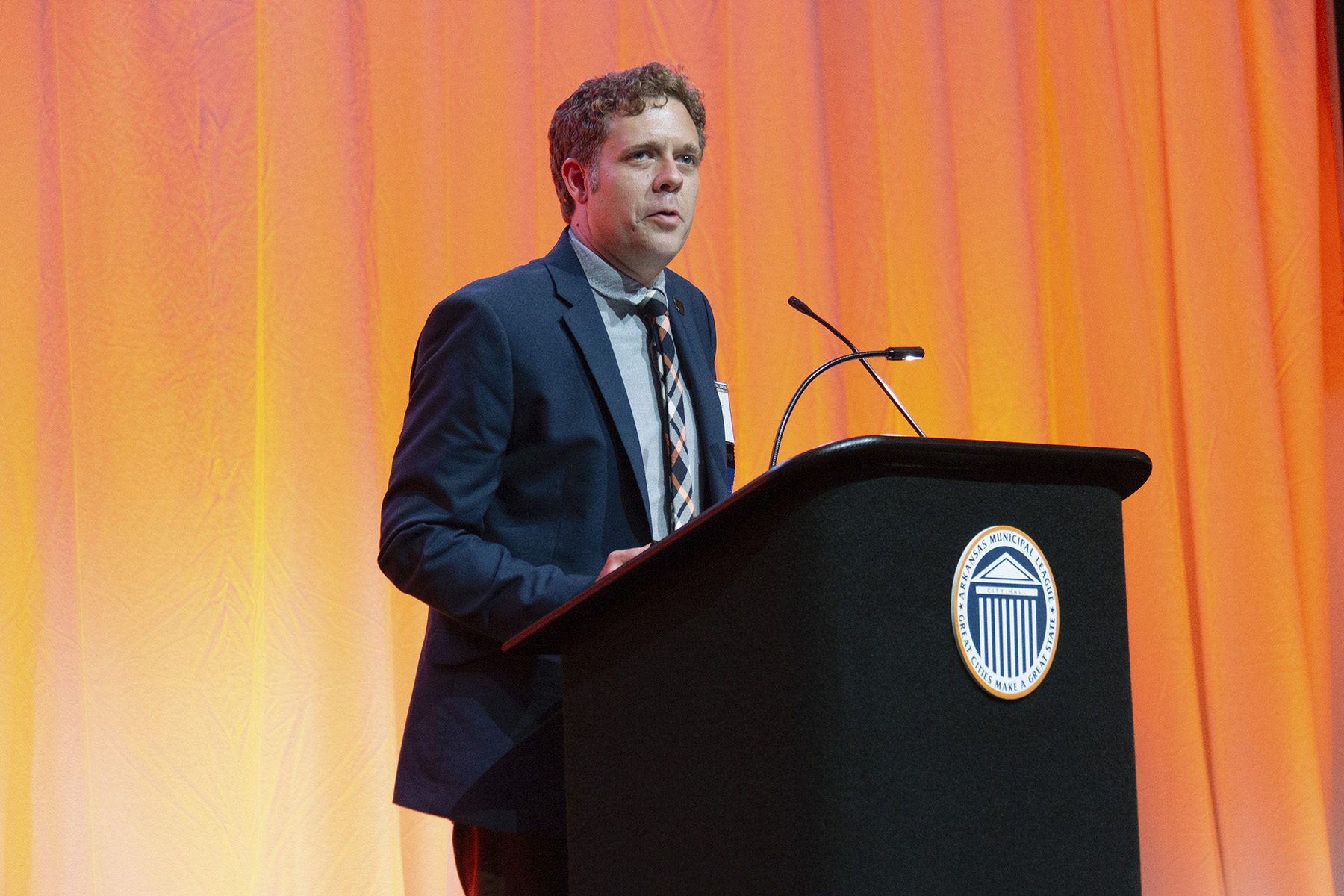
City and town leaders from across Arkansas gathered at the Little Rock Marriott and Statehouse Convention Center June 14-16 for the 89th Annual Convention of the Arkansas Municipal League, where they elected a new slate of officers for the coming year, approved the new policies and goals statement and a package of resolutions that will guide the League’s advocacy efforts, and participated in a plethora of educational sessions covering an array of topics important to municipalities. In addition to the convention’s general sessions, Thursday afternoon featured 21 concurrent sessions covering animal control, social media best practices, implementing youth councils, municipal planning, assisting the unsheltered population and many more pressing local issues.
During the annual business meeting on Friday, June 16, the League membership elected a new slate of officers for 2023-2024. The officers are: Cave City Mayor Jonas Anderson, president; Magnolia Mayor Parnell Vann, first vice president; Brookland Mayor Kenneth Jones, District 1 vice president; Clinton Mayor Richard McCormac, District 2 vice president; Eureka Springs Mayor Robert “Butch” Berry, District 3 vice president; and Crossett Council Member C.T. Foster, District 4 vice president.
In his acceptance speech, Anderson outlined his priorities for the year, with recruiting the next generation of local government leaders and public servants at the top of his list. “As you know, bringing in younger people, that’s the only way we can keep this going,” he said.
Anderson also addressed the wave of extreme partisanship we face, even at the local government level. Our time here and our resources are both too limited to waste time over petty disagreements, he said. “Unfortunately, it’s sweeping the nation right now and it seems to be sweeping the state of Arkansas, and I hope that we can get serious about that and turn that around before it’s too late, because once you go down that path it’s very hard to turn it around.”
Anderson asked the membership to help him with that task. “We’ve got to promote and model civility and level-headed decision-making. We’ve got to respect and encourage each other, maybe even when we wholeheartedly disagree.”
Attendance at the 89th Convention was strong, approaching pre-pandemic levels. Total attendance, both in person and virtual, was 1,388. The exhibit hall was bustling as well, with 104 companies and organizations exhibiting in person and several others participating in the virtual exhibit hall on the event app.
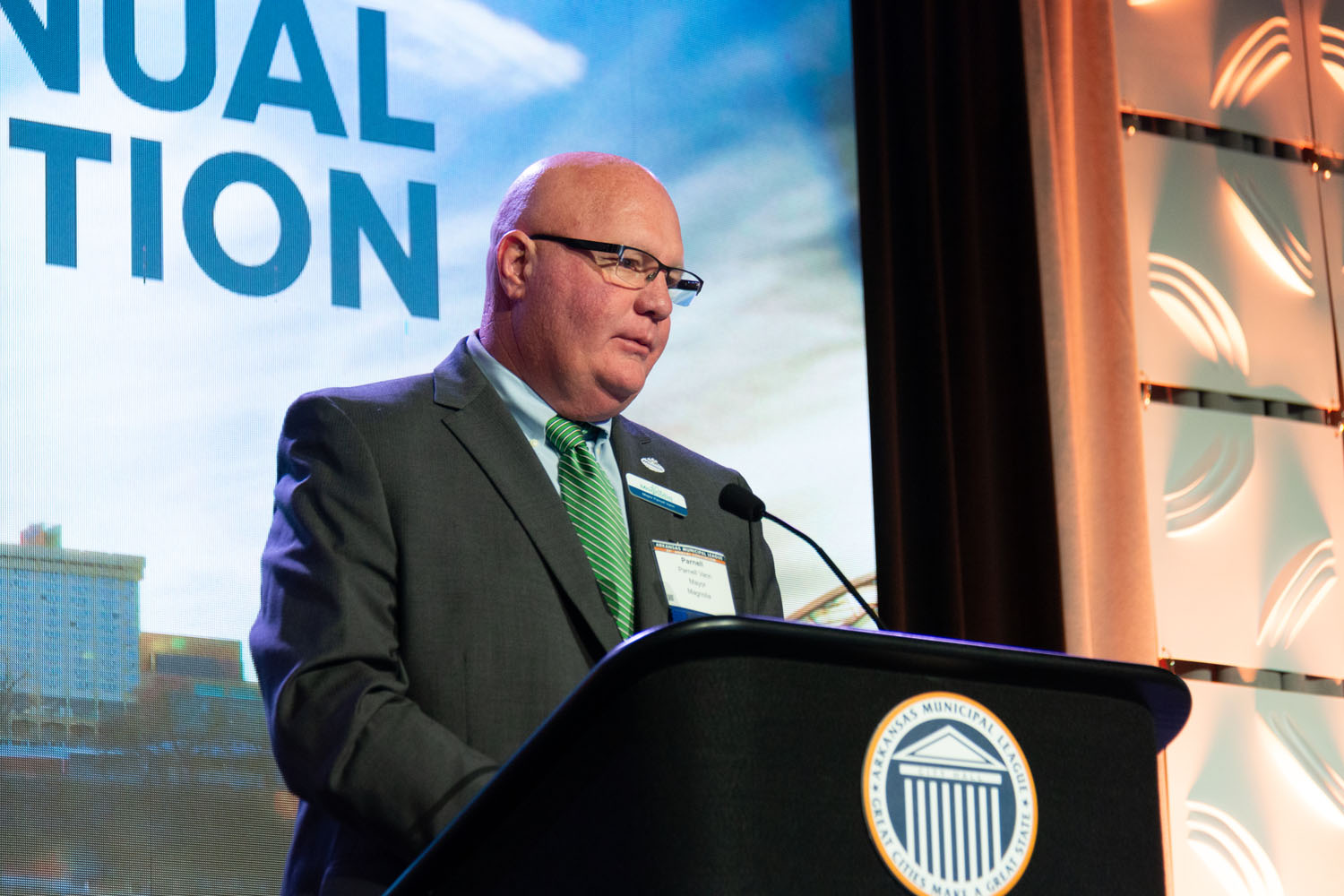
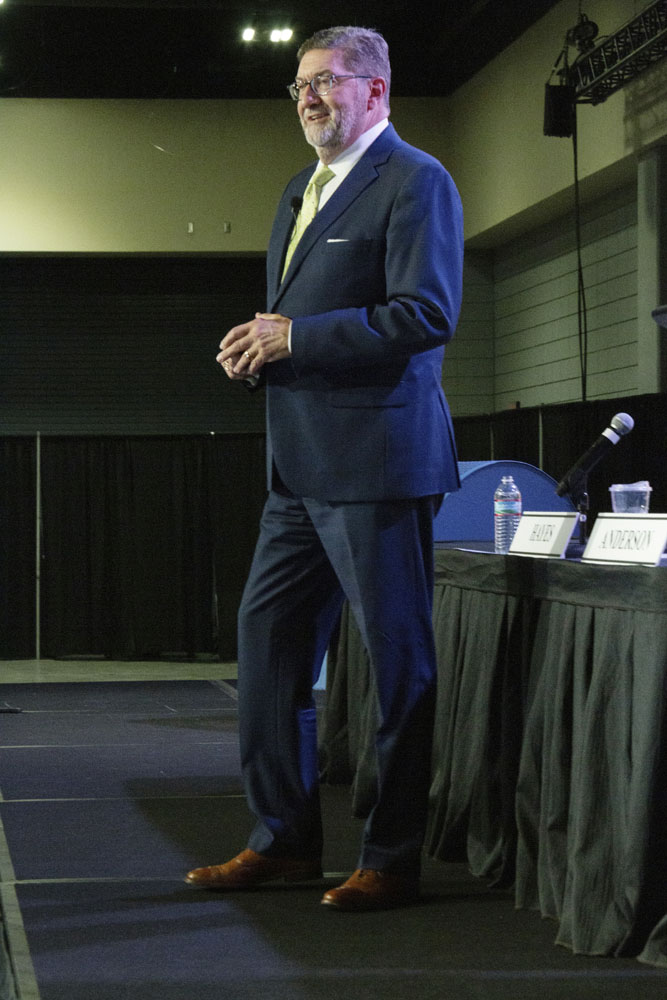
Magnolia Mayor and League First Vice President Parnell Vann presented the package of resolutions approved by the Resolutions Committee to the full membership during the annual business meeting on the morning of Friday, June 16. Convention delegates passed five resolutions, which include supporting the amendment of state laws regarding the publication of public notices, lowering the administrative fee charged by the state to collect local sales tax and to provide more options for cities to deal with nuisance and dilapidated properties. The package of resolutions will appear in the League’s updated Policies & Goals 2022-2023 publication, which, in addition to being available online, will be included as a supplement to the fall issue of City & Town.
During the June 16 annual business meeting, League Executive Director Mark R. Hayes, above, presented his annual report to the membership on the state of the organization and its programs. The League’s benefit programs are strong, he told the membership. “By pooling your funds and resources together, you’ve managed to build a very good set of programs that, quite frankly, are the envy of most of the state leagues in the country.” Hayes provided an overview of the participation in each of the League’s optional benefit programs, training and certification program participation, as well as other key stats from the past year. Those numbers and other important information are available in the “State of the League 2022-2023” report, which is available here.
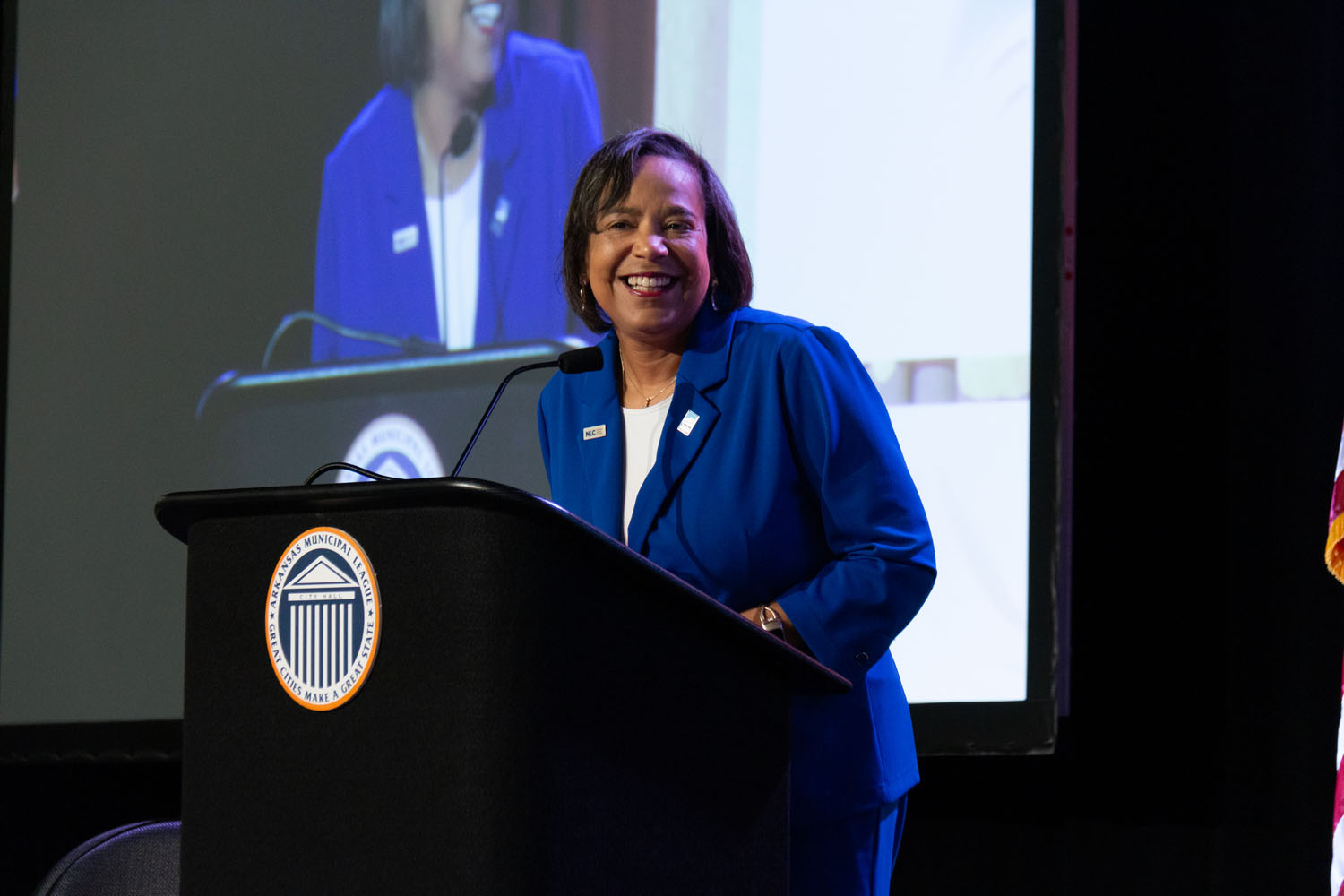
The League was honored to host Tacoma, Washington, mayor and this year’s National League of Cities President Victoria Woodards, who spoke during the 89th Convention’s opening general session on Thursday, June 15. She praised Arkansas’ municipal officials for their resilience over the past several years of unprecedented challenges and those dealing with the aftermath of the devastating March 31 tornado. “It’s easy just to lay down when something bad happens,” she said. “It takes true strength and courage get back up and to keep working.” On the national level, she touted NLC’s efforts to get money directly to local governments throughout the pandemic and in the infrastructure funding legislation passed by Congress. That has been essential because “those closest to the problem know best how to solve it,” Woodard said. “We advocated for that and, my friends, we succeeded.”
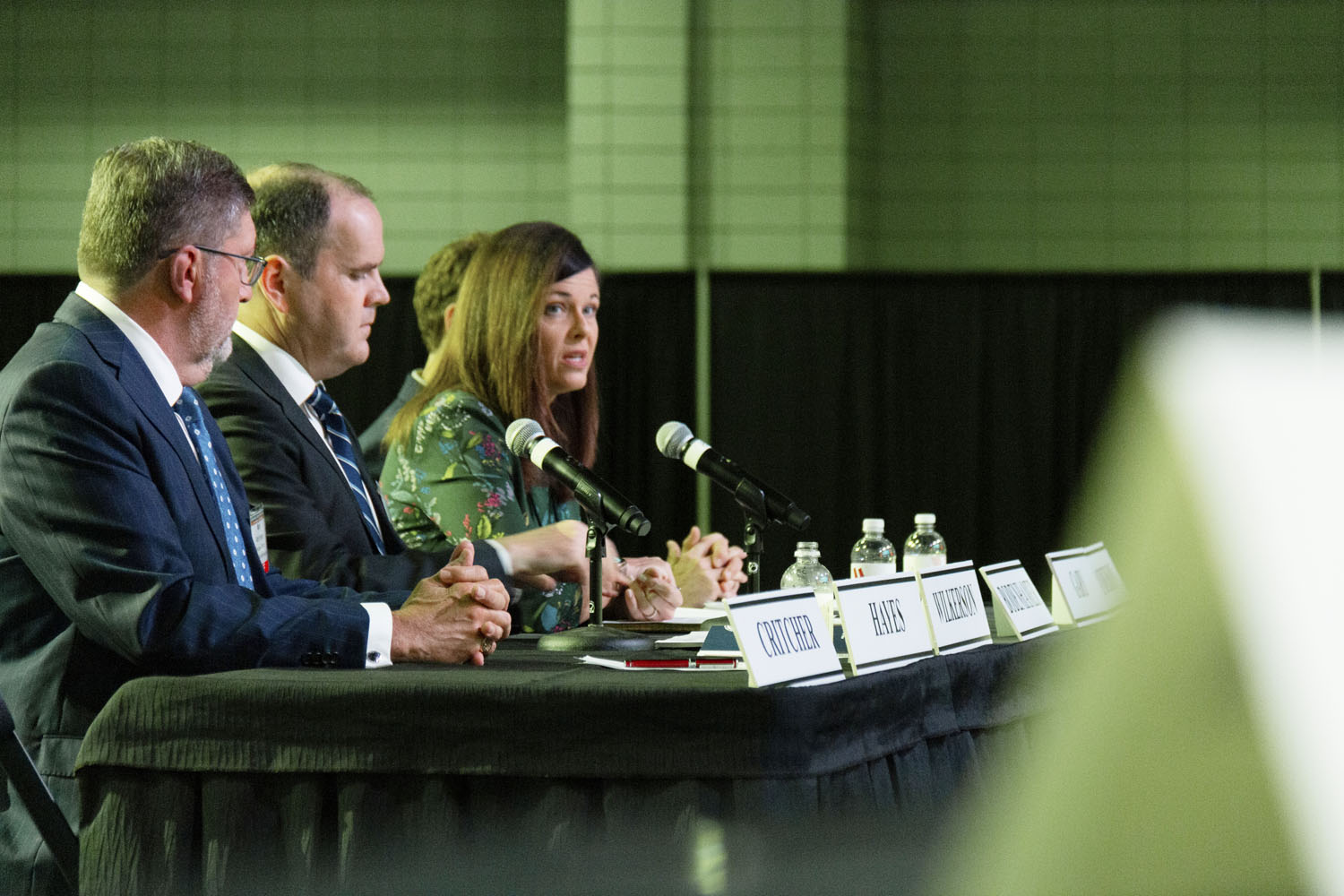
The Interim City, County and Local Affairs Committee has traditionally met during the League’s Annual Conventions, which gives the legislators a chance to mingle with city and town leaders while discussing issues that affect their constituents. During the 89th Convention we took it a step further, inviting the committee to hold the meeting during Wednesday’s first general session. Municipal Health Benefit Program General Manager and Benefits Counsel Katie Bodenhamer, speaking above, and the League’s Executive Director Mark R. Hayes and General Counsel John L. Wilkerson appeared before the committee to share details of the League’s intent to expand mental health care access through MHBP, particularly to first responders and other public safety employees who, studies have shown, experience depression, PTSD and other mental health challenges at higher rates than other professions.
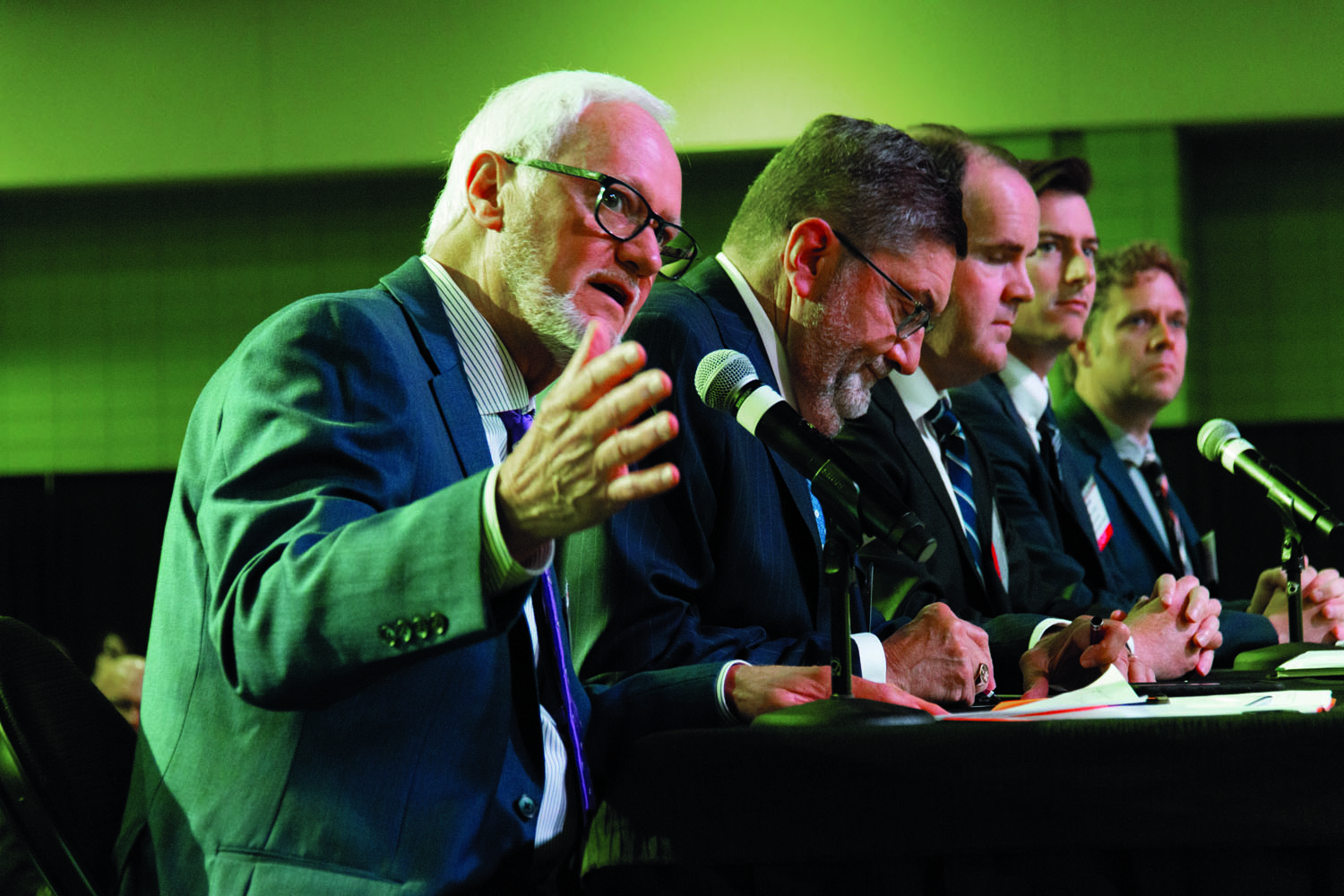
As part of the Interim City, County and Local Affairs Committee’s agenda, the League’s legislative advocacy team presented a brief review of the 94th General Assembly and discussed the relationship the League has worked to build with the legislators who serve our cities and towns. League Legislative Liaison Jack Critcher encouraged municipal leaders to continue to work closely with their legislators and to create good policy on local issues. “When cities do well the state does well, and when the state does well, the cities do well,” Critcher said. “It’s like the motto of the League says: Great Cities Make a Great State.”
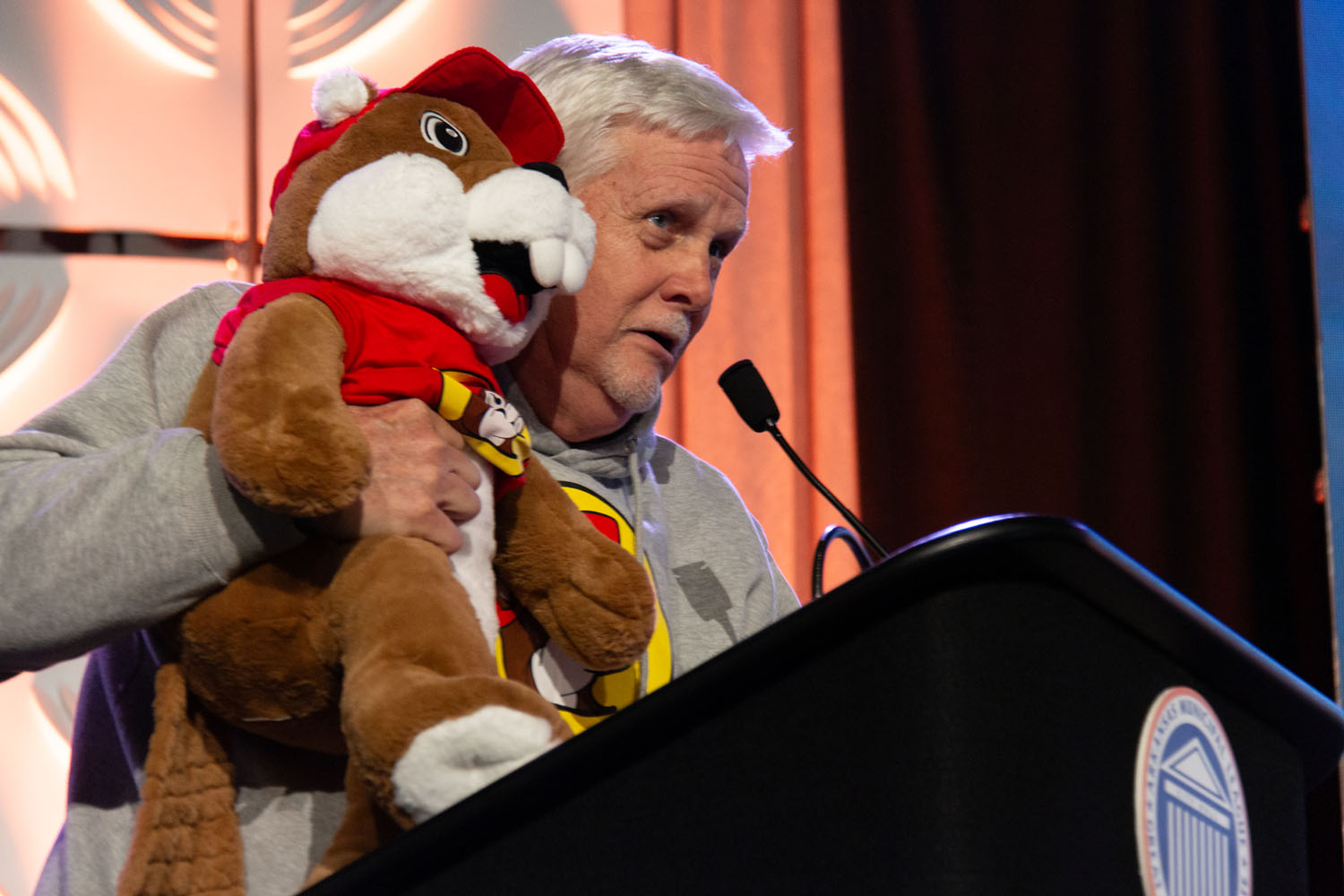
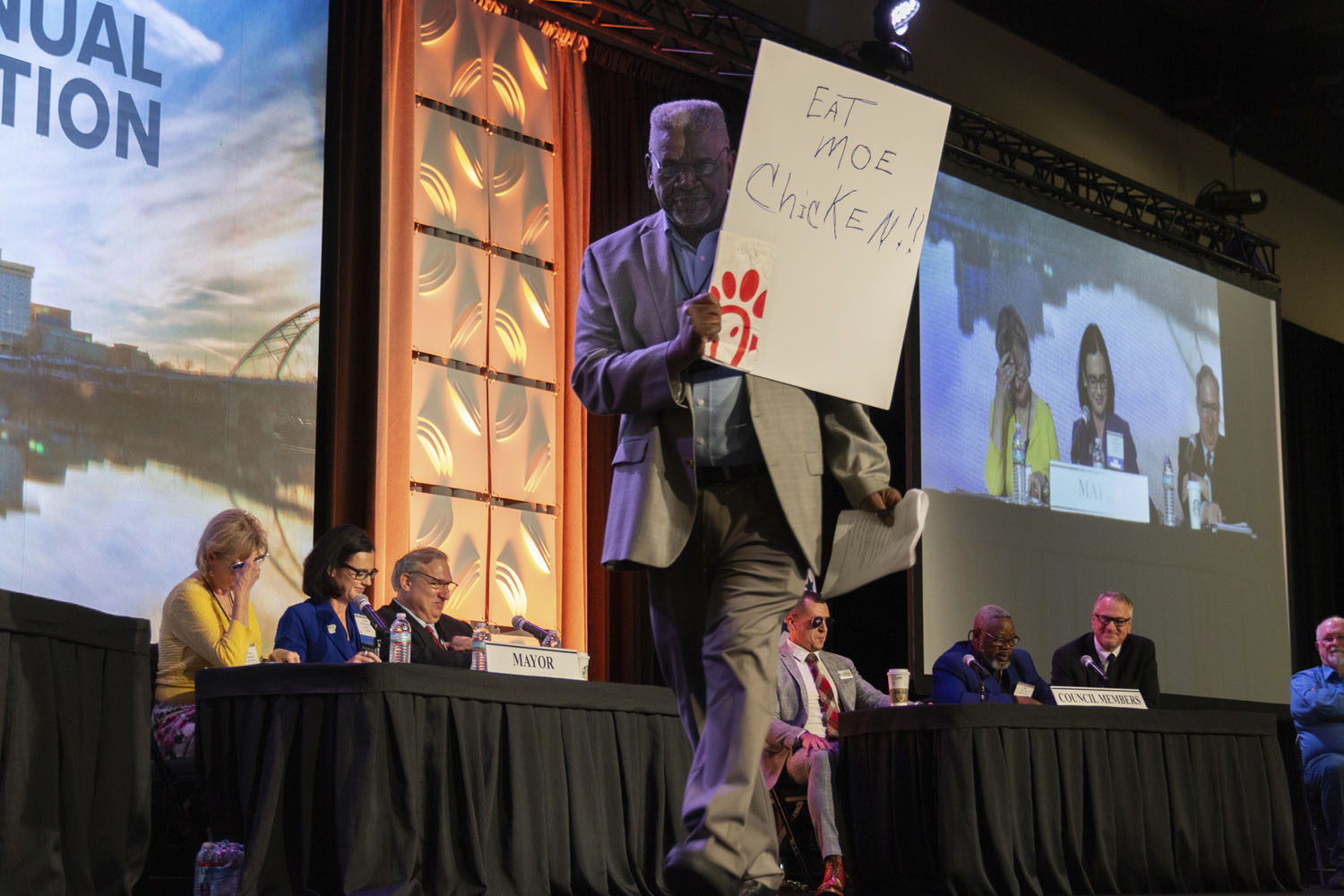
In addition to being great municipal officials, it turns out some of the League’s members are talented thespians who are willing to ham it up on stage for the sake of education! During the opening general session, the cast performed a mock city council meeting, covering the basics of parliamentary procedure, handling public comments and participation in the democratic process, going into executive session and more. At issue during this council’s meeting: whether or not to allow the building of a Buc-ee’s in “Arkville.” Among the citizenry, the plan had its passionate supporters (Greenwood Mayor Doug Kinslow, left, whose character would live in the beaver-themed convenience store if given the opportunity) and at least one chicken-loving detractor (played by Stephens Mayor Harry Brown, right, who claimed the new roadside behemoth would put his shop out of business).
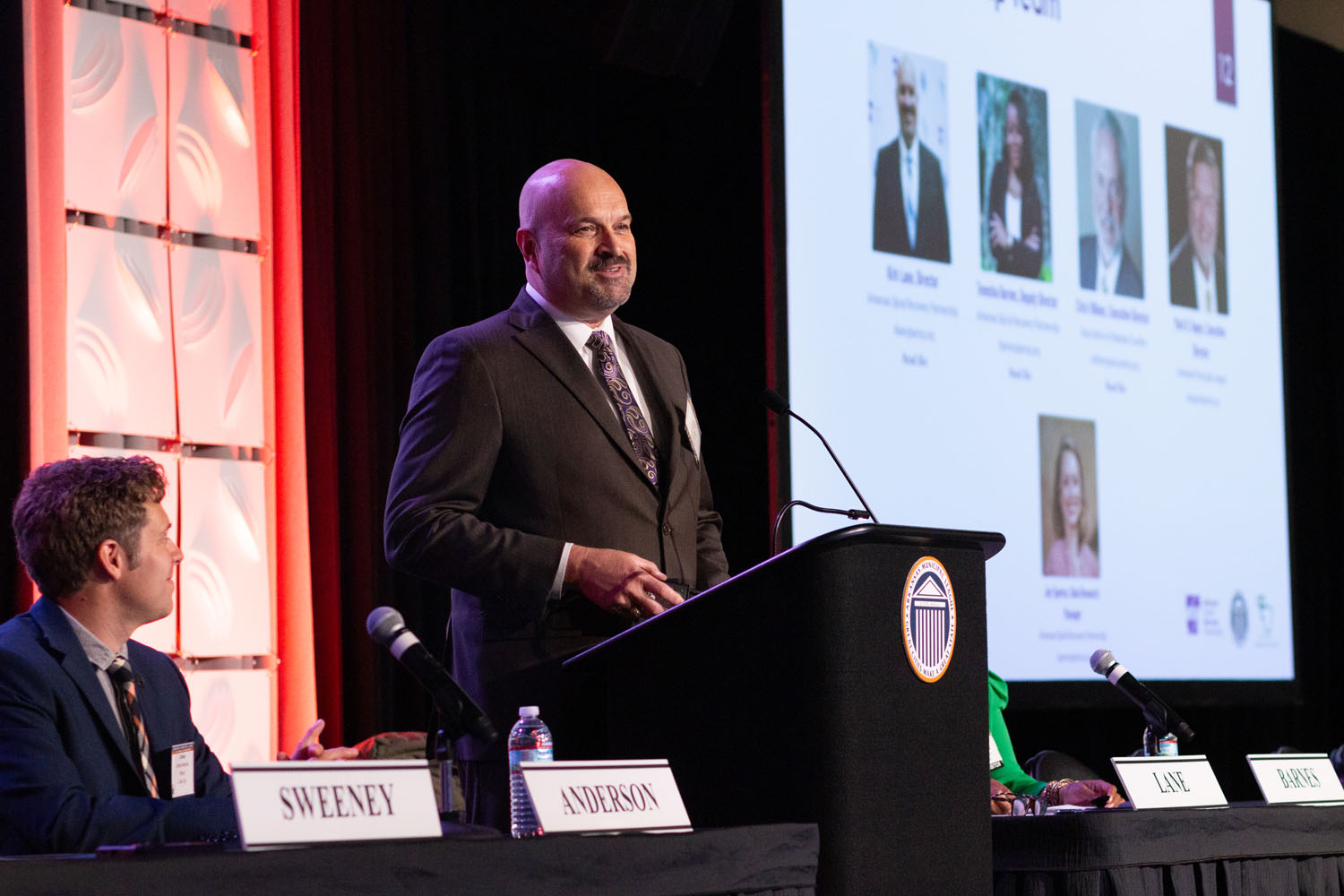
Despite progress over the past few years, “we are still the number two opioid prescribing state in the nation, as I stand before you today,” said Kirk Lane, director of the new Arkansas Opioid Recovery Partnership (ARORP), which is charged with using the state’s historic opioid settlement money to abate the ongoing opioid crisis in our communities. In its first year, ARORP is already making a difference in Arkansas cities and towns. As of June, ARORP had received 110 applications totaling more than $65 million in requested funding for prevention, treatment and other strategies. More than $250 million is expected to be distributed over the next 10-15 years as settlement payouts arrive. To keep up with the organization’s work and see the types of projects approved for funding, visit www.arorp.org. Arkansas is on the cutting edge in our approach to using the settlement money, Lane said. “Does it mean a chicken in every pot? Absolutely not. We’re looking at spending the money wisely to abate the opioid issue in your communities, so remember that going forward.”
League General Counsel John L. Wilkerson provided an overview of the Americans with Disabilities Act (ADA) Title II, which prohibits public entities from discriminating against individuals with disabilities. He and West Memphis Director of Tourism Jim Jackson discussed the accessibility issues the city faced when renovating the civic center. “At its heart, it’s civil rights legislation,” Wilkerson said. He asked municipal leaders to keep in mind that, at the League “we are not experts in this field; we’re experts in the intro of this field. We know enough to know when you may have an issue.” He encouraged officials to study the League publication, Americans with Disabilities Act Title II Compliance Guide, which is available as a free download at www.arml.org/free.
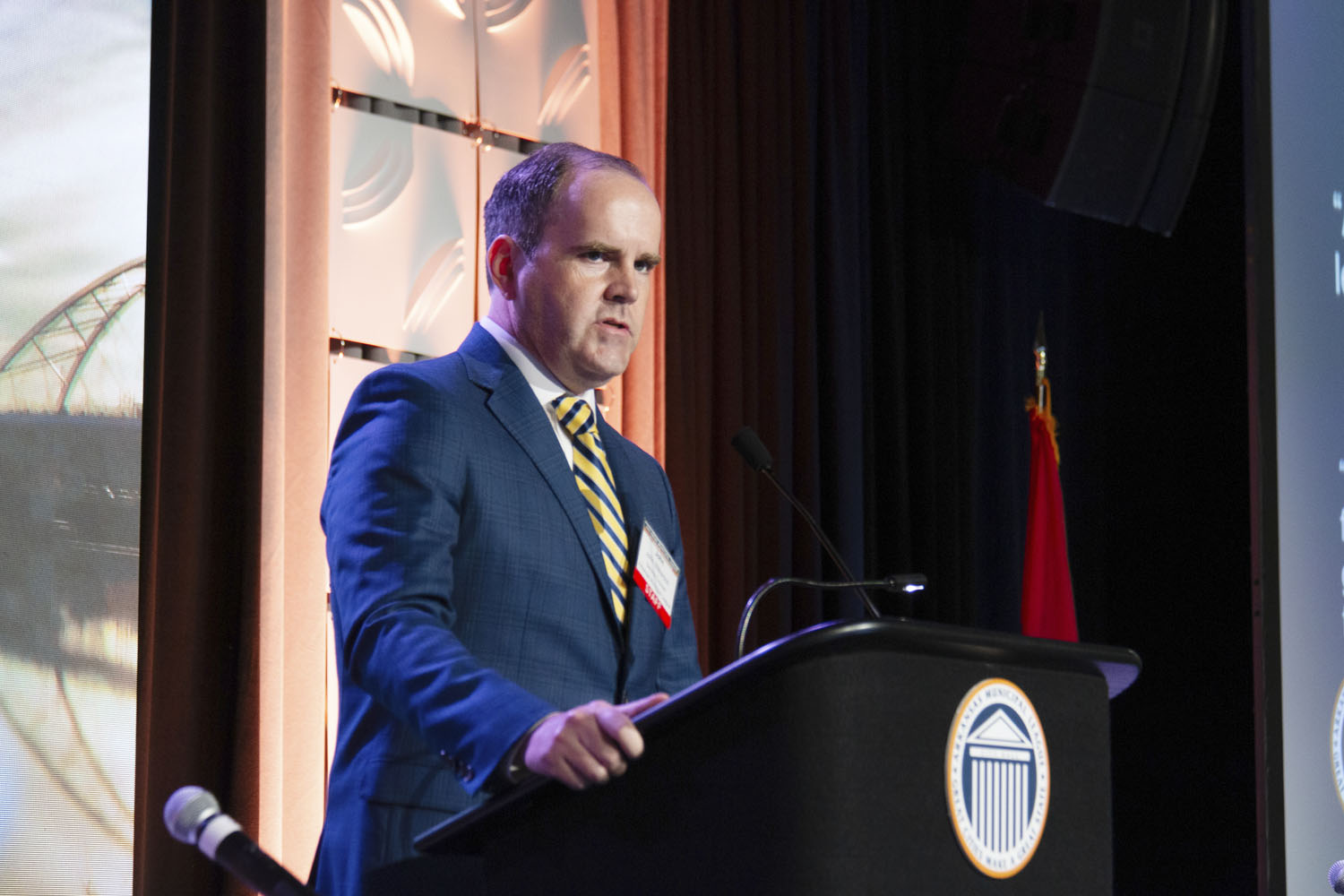
The League has made a concerted effort in recent years to increase its cybersecurity efforts and help its members do the same in their communities. One of the latest steps has been entering a partnership with the Little Rock-based Forge Institute and the Arkansas Cyber Defense Center to assess and mitigate cyber threats. The goal is twofold, according to founder and CEO Lee Watson, above. “One is we want to manage risk, and we want to create economic development opportunities for the state. Those are the two sides of the equation for us.” For municipalities, taking basic security steps helps a lot, such as learning the recognize and stop phishing scams and other attempts at accessing important data, said Jeff Melton, the League’s general manager of IT services. “Bad guys don’t hack into your network,” Melton said, “they log into your network.”
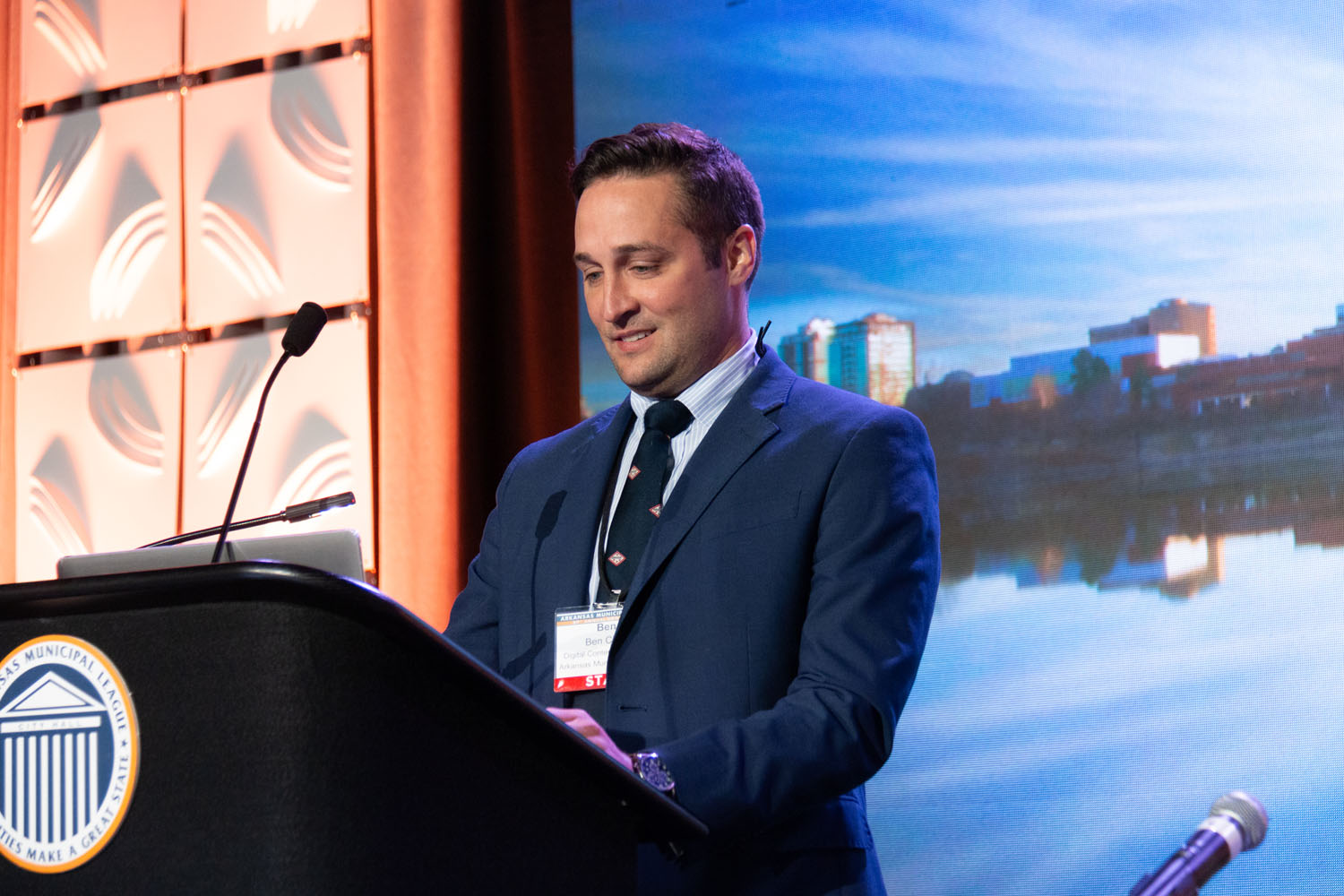
The League is in the process of revamping its educational outreach and expanding its curricula, both for in-person classes and online learning options. To that end, the League is launching a new learning management system, or LMS, which will allow members to access a wide variety of training opportunities online. The working title is the Arkansas Civic Education Hub, and we will be sharing more information about it very soon. To provide members with a preview of what to expect, League Communications and Creative Manager Mel Jones and Digital Content Specialist Ben Cline, above, walked Executive Director Mark R. Hayes and the audience through an example of how the system works.